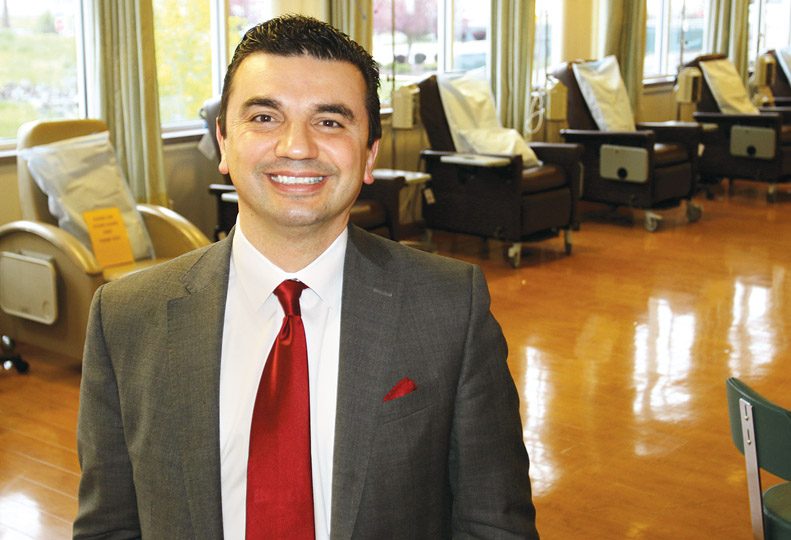
Home » Cancer Care Northwest grows its stem-cell transplant program
Cancer Care Northwest grows its stem-cell transplant program
CCN could handle up to 40 transplants this year

May 10, 2018
Since Spokane Valley-based Cancer Care Northwest opened the first autologous stem cell transplant program here in 2005, it has conducted 271 transplants on patients ranging from 15 to 78 years old.
Dr. Hakan Kaya, an oncologist, hematologist, and senior partner with Cancer Care Northwest, serves as director of the Inland Northwest Myeloma/Lymphoma & Transplant Program. Located at 601 S. Sherman, the program uses autologous stem cell transplants to help replenish a patient’s blood cells when he or she undergoes high-dose chemotherapy.
Autologous stem cell transplants use the patient’s own cells, he says.
Cancer Care Northwest launched the program in 2005, says Kaya. Three transplants were performed through the practice’s program that year.
This year, he expects the practice will perform up to 40 transplants, all at Sacred Heart Medical Center & Children’s Hospital, he says.
“That’s really remarkable because patients (would have had) to go to Seattle for those transplants. They would have had to spend two to three months in the Seattle area away from their families and have a caregiver with them all the time, so that was a big problem for patients,” claims Kaya.
In the program here, autologous stem cell transplants are used for all types of lymphoma, as well as multiple myeloma, all of which are forms of blood cancers, he says.
The most common form of blood cancer is lymphoma, or cancer of the white blood cells, says Kaya.
Lymphoma can enter remission with regular chemotherapy. If the cancer returns, however, then typical chemotherapy treatment generally doesn’t work and the patient requires high-dose chemotherapy, he says.
With high-dose chemotherapy, both cancerous and healthy blood-forming bone marrow cells are killed, leaving a patient with a low blood cell count. A stem cell transplant can replenish that normal bone marrow cell supply so the patient’s body can produce healthy blood cells, says Kaya.
For lymphoma patients, doctors harvest stem cells while the patient is in remission, he says.
Autologous stem cell transplants can cure lymphoma, but it can’t cure multiple myeloma, says Kaya. It does, however, help patients live longer and can put the cancer into a deep remission.
Patients with multiple myeloma--which is a chronic, currently incurable disease—can have their stem cells collected even when they aren’t in remission, says Kaya. That’s because those cancer cells don’t survive long outside of the bone marrow and have difficulty rooting into the system of a patient who has undergone high-dose chemotherapy.
After the transplant, the bone marrow stem cells require about 10 days to start producing blood cells again, says Kaya. Patients stay in Sacred Heart for that time.
“During those 10 days, we support the patient with blood transfusions, plated transfusion, and if they develop an infection, we get them an IV of antibiotics. After 10 days, their blood is formed. We let them go home,” he says.
All surgical aspects of the program take place at Sacred Heart—Cancer Care Northwest’s office space primarily is used for medical consultations, he says.
Another type of stem cell procedure, an allogenic stem cell transplant, which typically is used to treat acute leukemia, involves a separate donor.
Cancer Care Northwest doesn’t perform separate-donor transplants, but refers allogenic stem cell transplant candidates to transplant programs in Seattle.
Since the autologous stem cell transplant program opened here more than a decade ago, Kaya says Cancer Care Northwest’s supportive care measurements have improved.
“We have better antibiotics, better nausea medicine, and we are more experienced in Spokane,” he says.
Kaya says there are multiple benefits to choosing care in Spokane.
Stem cell transplant patients stay here for three weeks, as opposed to three months in Seattle, he asserts. Programs in Seattle are often outpatient programs and require a caregiver to administer medication after hours, which is uncomfortable for many, asserts Kaya. Spokane offers inpatient services, which enable family members to drop off patients and pick them back up three weeks later.
“Not everyone has a family member who can take three months off from work for this treatment,” he says.
In addition to coming from throughout Spokane County, clients travel from North Idaho and western Montana to receive care here, he says.
The stem cell transplant program includes a network of physicians, nurses, social workers, dieticians, blood bank staff, and other personnel, he says.
Cancer Care Northwest here also participates in studies that research lymphoma and multiple myeloma treatments.
“Therapy for myeloma especially has been improving over the last few years, so I expect that will make the transplant work even better,” says Kaya.
Cancer Care Northwest accepts all insurances, claims Kaya.
Looking forward, Kaya says the stem cell program here will continue to grow.
“I think we will probably expand the program to other communities in Idaho or Montana in the next few years,” he says.
Stephen Chun, marketing and business development manager for Cancer Care Northwest, says the privately-owned practice was founded 40 years ago. Cancer Care Northwest consists of 27 physicians; eight advanced practitioners, including nurse practitioners and physician assistants, and more than 250 support-staff employees.
Although the Sherman Street office is its only facility with the stem cell program’s expertise, Cancer Care Northwest maintains eight regional cancer care treatment centers in Spokane and Kootenai counties. It also has five outreach clinics in five Eastern Washington cities: Chewelah, Colville, Grand Coulee, Moses Lake, and Ritzville.
According to the Spokane County Assessor’s office, Cancer Care Northwest’s single-story Sherman Street facility occupies 22,100 square feet of space.
Kaya earned his medical degree from Ankara University, in Turkey. He is a fellowship-trained transplant physician, he says. He is also a clinical professor with Washington State University’s Elson S. Floyd College of Medicine.
Latest News Special Report Health Care
Related Articles
Related Products



![Brad head shot[1] web](https://www.spokanejournal.com/ext/resources/2025/03/10/thumb/Brad-Head-Shot[1]_web.jpg?1741642753)
